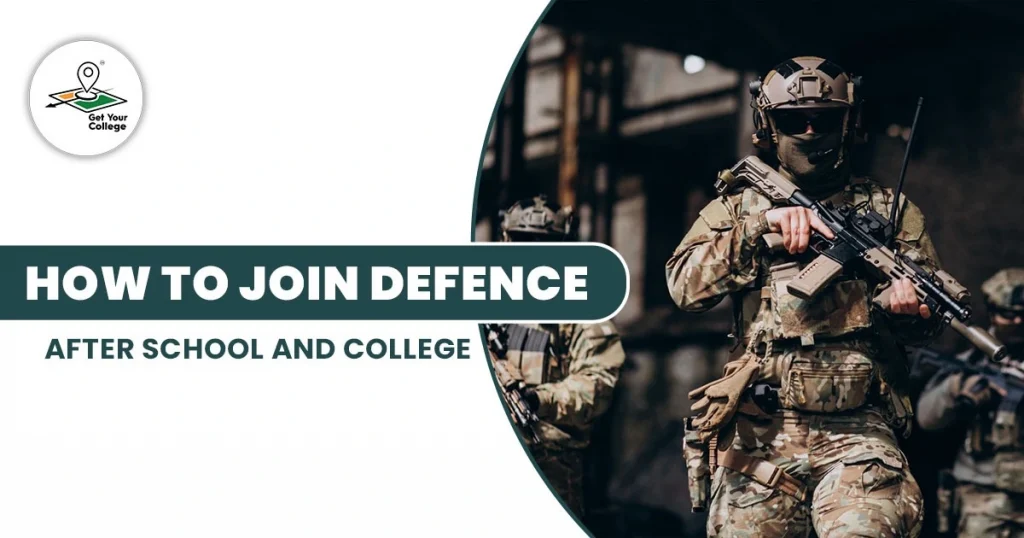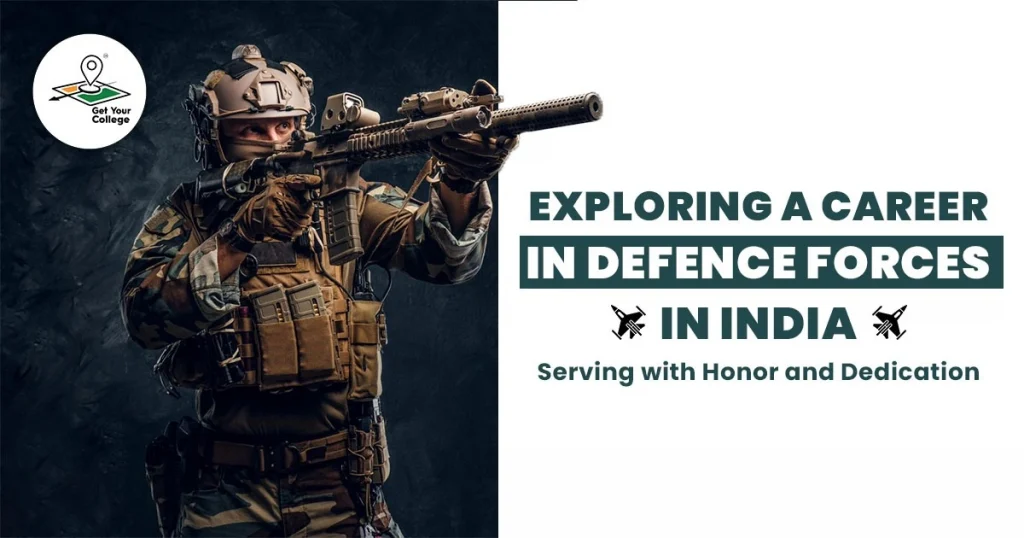In India, the Defence Forces are more than a profession, they led to a way of life filled with courage, discipline and commitment to duty. Offering a career path that blends national service with personal development and adventure, joining the Defence Forces presents a distinctive and fulfilling life. Whether it’s guarding the nation’s borders or engaging in humanitarian efforts, the Defence Forces stand as the guardians of India’s security and prosperity. The Defence Forces provide individuals with opportunities to grow, both professionally and personally, fostering a culture of excellence, camaraderie, and selfless service. For those who seek a career defined by purpose, challenge, and the chance to make a meaningful difference, embracing the journey of the Defence Forces is a choice that promises fulfilment and honour.
Why Choose Defence as a Career?
Choosing a career in the Defence Forces is frequently motivated by a profound longing to serve the nation and leave a significant mark on society. This calling is deeply rooted in a sense of duty and patriotism, compelling individuals to step forward and dedicate themselves to the greater good. Within the Defence Forces, a vibrant and multifaceted work environment awaits, where individuals are consistently pushed to achieve excellence in both mind and body. The bond forged through shared experiences alongside comrades—be they soldiers, sailors, or airmen—is unparalleled, fostering a sense of unity and purpose that transcends individual differences. Moreover, the Defence Forces present a plethora of avenues for personal and professional advancement. From honing specialised skills to undergoing rigorous leadership training and pursuing advanced education, every opportunity is laid out for those who seek to grow and excel. In essence, a career in the Defence Forces not only fulfils a deep-seated desire to serve but also offers a pathway to personal fulfilment, camaraderie, and continuous self-improvement.
Life at Defence Forces
Life within the Defence Forces is synonymous with discipline, camaraderie, and a profound sense of mission. From the very start, the journey is marked by intensive training programs designed to instil discipline and cultivate the skills necessary for success. Every facet of Defence life, from daily routines to operational duties, is geared towards fostering a culture of excellence and teamwork. Whether stationed at a remote border outpost or deployed on peacekeeping missions abroad, Defence personnel are tasked with upholding the nation’s security and values.
In the face of adversity, courage, resilience, and adaptability are not just desirable traits but essential qualities expected of every member. The thrill of serving in diverse operational roles brings with it a profound sense of purpose—a conviction that one’s contributions directly impact the safety and well-being of the nation and its citizens. The camaraderie forged amidst shared challenges and triumphs forms the backbone of Defence life, creating bonds that endure long after service has ended.
Ultimately, life in the Defence Forces is a journey defined by sacrifice, honour, and service—a calling embraced by those who are willing to dedicate themselves to a cause greater than themselves. It is a life where every moment is imbued with meaning, every challenge an opportunity to prove one’s mettle, and every victory a testament to the unwavering spirit of the men and women who serve..
How to Join Defence after School and College

Joining the Defence Forces after school or college involves navigating through various examination processes tailored to different educational backgrounds. For school pass outs, the National Defence Academy (NDA) and Naval Academy Examination (NA) provide a direct route.
On the other hand, college graduates can opt for the Combined Defence Services Examination (CDSE), a comprehensive test covering a wide range of subjects and evaluating leadership qualities alongside academic knowledge. Additionally, the Short Service Commission (SSC) entry offers opportunities for specific branches, requiring candidates to demonstrate their suitability through written exams, interviews, and medical assessments.
Regardless of the entry route chosen, success in these examinations paves the way for rigorous training at prestigious military academies such as the Indian Military Academy (IMA) or the Officers Training Academy (OTA). This training equips individuals with the skills, knowledge, and mindset necessary to excel in their roles within the Defence Forces.
NDA NA
The National Defence Academy (NDA) and Naval Academy Examination (NA) serve as entry points for school graduates aspiring to join the Defence Forces. Open to candidates who have completed their schooling, these examinations offer a direct pathway into esteemed branches of the military—namely, the Indian Army, Navy, or Air Force. Beyond merely evaluating academic proficiency, the NDA and NA exams meticulously assess candidates’ aptitude and physical fitness, ensuring they possess the requisite attributes to excel in demanding military roles.
Combined Defence Services Examination (CDS):
Tailored for college graduates, the Combined Defence Services Examination (CDS) provides an avenue for entry into diverse branches of the Defence Forces. This comprehensive examination evaluates candidates’ academic abilities across multiple subjects, including English, general knowledge, and mathematics, while also scrutinising their leadership potential and physical fitness. Successfully clearing the CDS opens doors to a myriad of opportunities within the Defence Forces, enabling individuals to embark on a fulfilling career as commissioned officers.
Short Service Commission (SSC) Entry:
College graduates seeking specialised roles within the Defence Forces can opt for the Short Service Commission (SSC) entry. This pathway offers short-term commissioned positions tailored to specific branches, providing candidates with opportunities to contribute to the military’s mission. To qualify for SSC positions, candidates must navigate through a rigorous selection process comprising written examinations, interviews, and medical evaluations, ensuring that only the most qualified individuals are entrusted with these esteemed roles.
Process to Become a Commissioned Officer
Becoming a commissioned officer in the Defence Forces is a pinnacle of achievement, demanding unwavering dedication, relentless perseverance, and a steadfast commitment to excellence. Among the pivotal stages of this selection process is the Service Selection Board (SSB) interview, a comprehensive evaluation of a candidate’s personality, leadership potential, and suitability for military life.
The Service Selection Board (SSB) process is a rigorous and comprehensive evaluation conducted over several days to assess candidates’ suitability for commissioning as officers in the Defence Forces. Here’s a detailed breakdown of the SSB process day by day:
Day 1:
Reporting and Documentation: Candidates report to the designated SSB centre and complete the necessary documentation.
Screening Test: The day starts with the Officer Intelligence Rating (OIR) Test and Picture Perception and Description Test (PPDT). In the PPDT, candidates view a picture for 30 seconds and then write a story based on it. Those who qualify move forward to the next stage.
Day 2:
Psychological Testing: This day involves a series of psychological tests designed to assess candidates’ personality traits, attitudes, and emotional intelligence. These tests include the Thematic Apperception Test (TAT), Word Association Test (WAT), Situation Reaction Test (SRT), and Self-Description Test (SD).
Personal Interview: Each candidate faces a personal interview conducted by a panel of officers. The interview aims to assess the candidate’s suitability for an officer’s role, focusing on their academic background, extracurricular activities, interests, and motivations for joining the Defence Forces.
Day 3 & 4:
Group Testing Officer (GTO) Tasks: Candidates undergo a series of outdoor group tasks designed to evaluate their leadership, teamwork, and problem-solving abilities. These tasks include Group Discussion (GD), Group Planning Exercise (GPE), Progressive Group Task (PGT), Group Obstacle Race (GOR), Command Task (CT), and Final Group Task (FGT).
Day 5 :
Conference: On the final days, candidates appear before a board of assessors for a conference. Here, the assessors review all aspects of the candidate’s performance throughout the SSB process and decide on their suitability for commissioning as officers.
Upon successfully clearing the selection process, chosen candidates embark on a transformative journey at premier military academies such as the Indian Military Academy (IMA), Officers Training Academy (OTA), or Air Force Academy (AFA). Here, they undergo rigorous training that hones their physical prowess, sharpens their mental acuity, and instils in them the values of discipline, integrity, and selflessness. Under the guidance of seasoned instructors and mentors, aspiring officers are groomed to assume leadership roles and command positions within their respective branches of the Defence Forces.
Conclusion
A career in the Defence Forces is not merely a job but a calling—an opportunity to serve one’s country with honour, courage, and integrity. For those who are willing to embrace the challenges and responsibilities that come with it, a career in the Defence Forces offers a path to personal fulfilment, professional growth, and a lifelong sense of pride in serving the nation. As the guardians of India’s sovereignty and security, Defence personnel embody the highest ideals of patriotism and selflessness, standing ready to defend the nation against all threats, both domestic and foreign. So, if you are driven by a sense of duty and a desire to make a difference, consider a career in the Defence Forces—it may just be the most rewarding journey you’ll ever embark upon.



